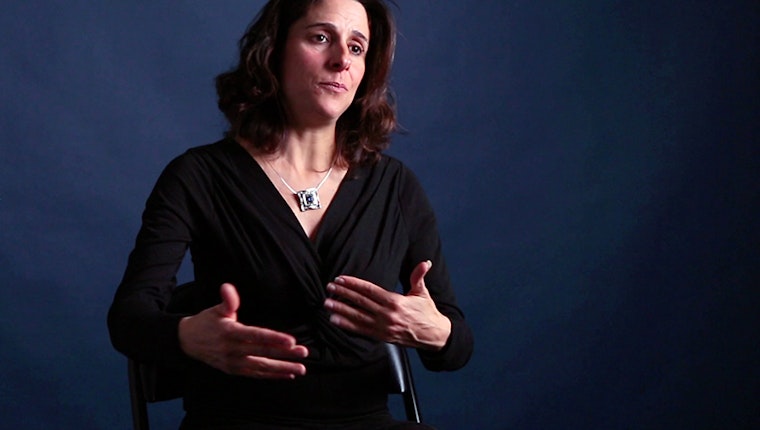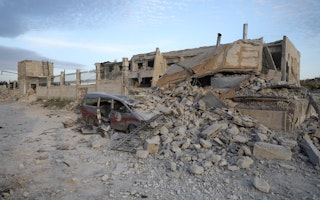Overcoming Barriers in the Occupied Palestinian Territories
By Lauren Frohne

Gisha is an Israeli human rights organization that promotes the right to freedom of movement. They provide legal assistance to people in Gaza who need permits from the Israeli military in order to travel. They also engage in public advocacy, within Israel and abroad, to try to change policies that restrict freedom of movement but that don’t involve legitimate security needs. I spoke with Gisha’s founder, Sari Bashi.
How did restriction of movement in the West Bank and Gaza begin?
The Israeli–Palestinian war in 1948 took one area that had been a single, territorial, cultural, economic unit and divided it into separate areas. After the Israeli occupation in 1967, there was freedom of movement among the West Bank, Gaza, and Israel, which—as the occupation continued and people began to resist the occupation—became restricted.
Beginning in the 1990s, Israel began to seal the borders in ways that were really hard for Palestinians living in the West Bank and Gaza. Imagine that overnight the mayor of New York declares that people from Brooklyn can no longer enter Manhattan.
How big is the impact of these restrictions?
Maybe the most painful part of that is family separation: mothers who can't reach their kids in the West Bank, husbands who can't get back to their wives. And it affects tens of thousands of people every day.
There are jobs and economic opportunities between the two parts of the Palestinian territory that are cut off. People can't sell goods anymore. The ice cream factory in Gaza can no longer get its ice cream to stores in the West Bank. That has a very detrimental effect on the economy.
It means that the right to engage in a dignified livelihood is not allowed. There's a sense of living on donor aid. More than 70 percent of people in Gaza are dependent on humanitarian assistance.
What about education?
Since 2000, there’s been a ban on students from Gaza studying at West Bank universities. Certain fields of study are just not available in Gaza, and students have no option to study them in the West Bank.
We had a case a few years ago that was very painful, in which women’s rights activists from Gaza were accepted to a gender studies master’s program in the West Bank. They weren’t allowed to reach their studies, not because of security claims against them—in fact, many of these women had visited the West Bank for short-term visits.
But they weren’t allowed to remain in the West Bank for the year or year-and-a-half it would take to get their master’s degree. Women’s rights activists in Gaza should be encouraged—not prevented from doing what they need to do.
So what are you and your organization, Gisha, doing to challenge some of these restrictions?
Every year Gisha helps about 1,000 people overcome travel restrictions to get where they need to go. When we help a woman overcome a travel restriction to reach her PhD studies, and five years later she becomes a doctor in chemistry, we feel like we’ve done something, not just to help her but actually to help Palestinian society.
We’ve done a lot of work to call attention to the ways in which these restrictions are harming not only Palestinian human rights but also Israeli and American interests. One of our most successful campaigns was based on showing that the U.S. government was withdrawing funds for Fulbright students in Gaza because Israel wouldn’t allow them to access their studies.
We were able to place a front-page story on the New York Times. Within 48 hours the policy changed. And more importantly, people in Israel and the United States began to see a different, negative side to the restrictions on freedom of movement—that squeezing people tight in Gaza was harming a lot of people who we might otherwise respect and admire, such as Fulbright scholars.
What’s the potential to improve life for Palestinians and Israelis?
There’s so much opportunity and so much hope. It’s a very young population in Gaza. If we allow them to see possibility for hope, for fulfilling their aspirations, we could have amazing things happen in the Middle East.
It’s a win-win situation. It’s a question of encouraging leaders, especially within Israel but also within the United States, to recognize that nobody’s interest is served when women can’t get a master’s in gender studies. Nobody’s interest is served when a factory owner fires his employees because he can’t get his goods to market.
And as we have more transparency about the policies and a more sober, rational discussion about Israeli–Palestinian policy, we’ll see improvements.
Gisha is supported by the Open Society Foundations. At Open Society is a video series highlighting the people and ideas that are inspiring our work—and changing the world.
Until September 2014, Lauren Frohne was a multimedia producer for the Open Society Foundations.


